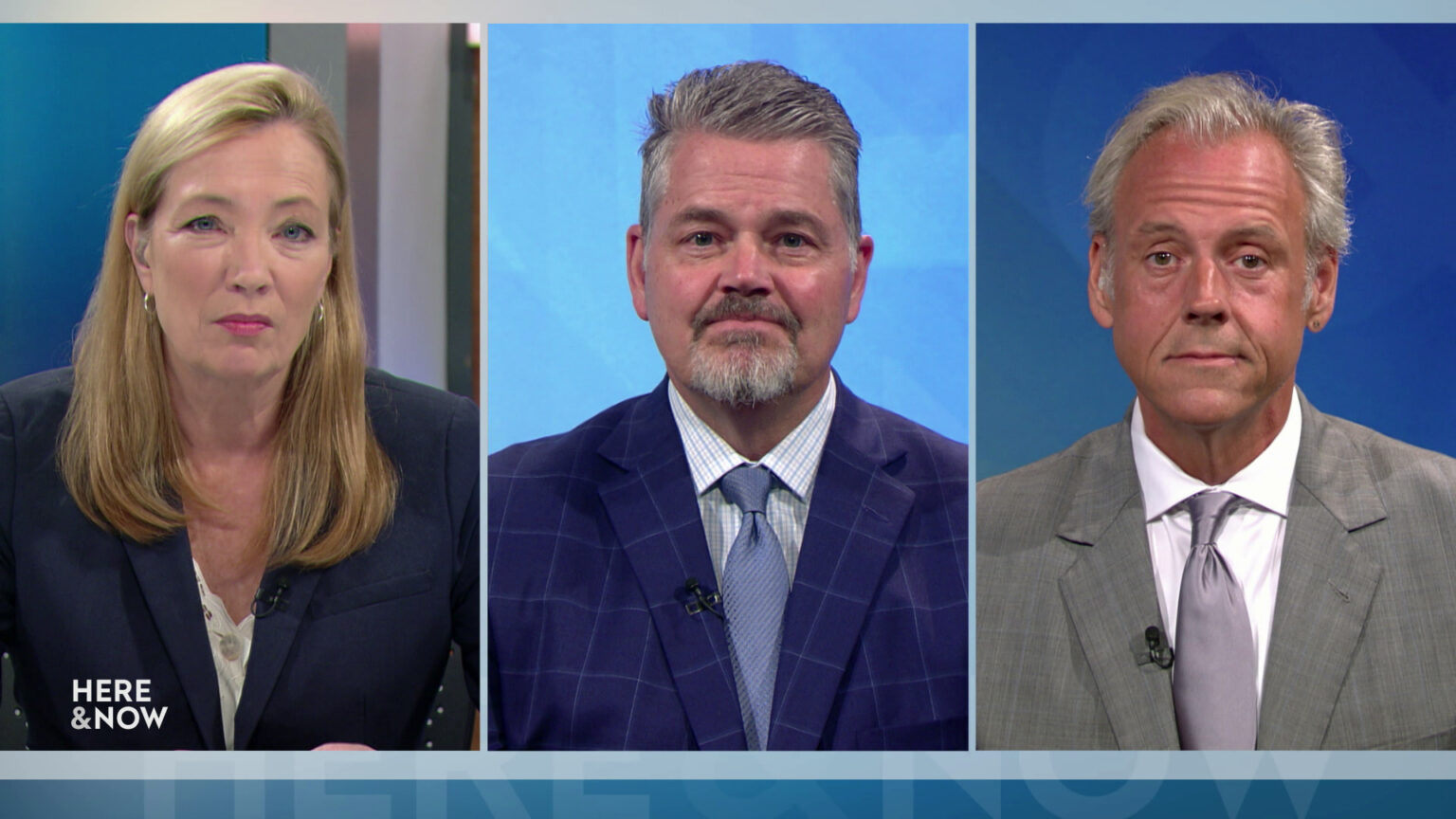'Here & Now' Highlights: McCoshen & Ross, Anthony Chergosky, Dr. Ryan Westergaard
Here's what guests on the Aug. 12, 2022 episode said about the Wisconsin primary election results and the status of monkeypox in the state.
By Frederica Freyberg | Here & Now
August 15, 2022

Frederica Freyberg, Bill McCoshen and Scot Ross (Credit: PBS Wisconsin)
The Donald Trump-endorsed Republican candidate for governor, Tim Michels, beat the “establishment” candidate, former Lt. Gov. Rebecca Kleefisch, in Wisconsin’s primary election on Aug. 9. Democratic general election U.S. Senate candidate, Mandela Barnes, will square off against incumbent Republican Sen. Ron Johnson. In the 3rd Congressional District, the Trump-endorsed Republican candidate, Derrick Van Orden, will go up against the Democratic primary winner, state Sen. Brad Pfaff in a closely watched election. Wisconsin is seeing a rising number of monkeypox cases as the U.S. Department of Health and Human services declared the disease a public health emergency
Bill McCoshen and Scot Ross
Republican and Democratic political analysts
- The partisan panelists shared their perspectives about former Lt. Gov. Rebecca Kleefisch’s loss to businessman Tim Michels in the Republican primary for Governor.
- McCoshen: “Donald Trump’s endorsement: No question that was a major factor in Tim Michel’s victory on Tuesday. But I think the other part was his outsider status as a guy who’s never held public office before. Yes, he ran for United States Senate in 2004, but the fact is he’s never held a public office, and that was really appealing. I think the third piece, truthfully, were the resources, right? He had the right amount of resources to get his message out there and he had a message that resonated. There’ll be lots and lots of people will say, well, he won because he spent $13 million or whatever the final number is. Well, if money was the deciding factor, then Alex Lasry would be the nominee for the Democrats for United States Senate. It wasn’t just money.”
- Ross: “Tim Michels flew in on his private jet from Connecticut and bought the election. If you want to talk about a fractured party, the fact that Rebecca Kleefisch has been the standard bearer under Walker for the last 10 years, doing all the rubber chicken circuit, going out and making all the attacks on Democrats, raising money for Republicans. And then she loses this to a guy who came in and basically took Trump’s endorsement and ran with it. I mean, I think that the Republican Party is going to have to do a lot of healing. They might finally ask for the Medicaid money so that they can get health care access to heal these wounds and build.”
Anthony Chergosky
Professor, UW-La Crosse Department of Political Science and Public Administration
- Chergosky said election observers consider the 3rd Congressional District in western and central Wisconsin one of the most likely districts in 2022 to flip party control in the U.S. House of Representatives. He offered a comparison of candidates Derrick Van Orden, the Republican nominee, and Brad Pfaff, who won a competitive Democratic primary on Aug. 9.
- Chergosky: “Derrick Van Orden focuses a lot on national political issues. He’s very active on social media and really focuses on the issues that animate the Republican base nationally. Those culture war issues, those issues related to Joe Biden and wanting to defeat Joe Biden and wanting to unseat the Democrats for majority control. So he’s really in line with the national Republican messaging. Brad Pfaff, on the other hand, is trying to localize this race, focus on those local issues – agriculture being a key one. Education being another one. We have many UW campuses in this district. UW has a major presence in this area. So all of that could play out in this campaign in unpredictable ways.”
Ryan Westergaard, M.D.
Chief medical officer and state epidemiologist for communicable disease, Wisconsin Department of Health Services
- The U.S. Department of Health and Human Services declared monkeypox a public health emergency, with cases nationwide topping 10,000 by mid-August. In Wisconsin, Dr. Westergaard said confirmed cases picked over the previous week – numbering 40 in 10 counties as of Aug. 12, with an expectation of more infections.
- Westergaard: “Monkeypox is a virus that is a cousin of the smallpox virus, which, of course, used to cause a lot of severe disease but then we’ve eradicated through vaccination. Monkeypox is naturally found in some animal populations, which is where it got its name, and it has spilled over into human populations various times, including about 2000 to 2003. There was an outbreak in the Midwest. This particular monkeypox outbreak is different. Although it’s not typically considered a sexually transmitted disease, it’s spreading that way in this current global outbreak, affecting predominantly men who identify as gay or bisexual.
- Westergaard explained why this population is at higher risk in this outbreak.
- Westergaard: “The initial infections in people were among men who had traveled, who had attended large gatherings where a lot of close to skin-to-skin or intimate contact was taking place, and it spread throughout those social and sexual networks around the world. So I think it’s important that that the group of men who have sex with men or identify as gay or bisexual know that they are at highest risk. But it’s also important for the general public to know that anyone is susceptible to this. People in the household, contacts of people who are household contacts — if they come into close contact with a person or even with towels or linens that are shared — can contract this virus.”
Watch new episodes of Here & Now at 7:30 p.m. on Fridays.
 Passport
Passport











Follow Us